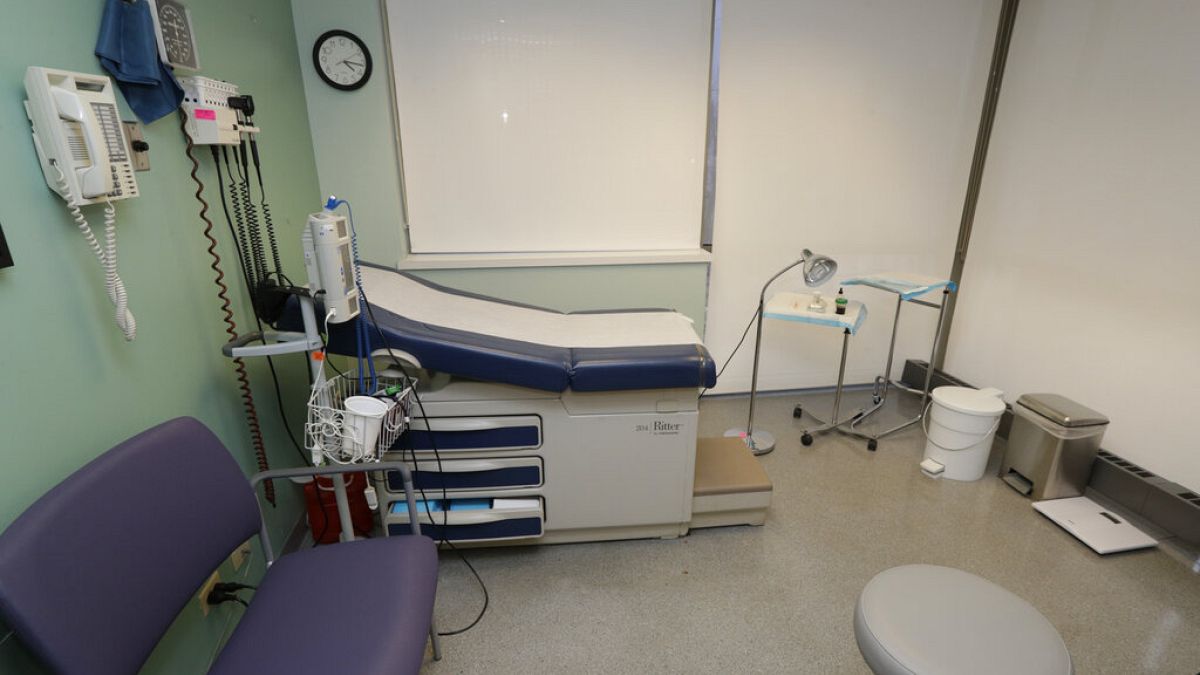"Cancer doesn’t care who you are," say campaigners as they urge improved cervical screening for the transgender community.
More should be done to include trans and gender-diverse people in the UK's cervical screening programme, an expert has told Euronews.
Dr Kate Nambiar, who specialises in sexual and reproductive health, said people who don't identify as women but still have a cervix feel excluded because healthcare authorities are not sending them routine reminders to book an appointment.
Other campaigners say such people also feel a stigma about asking to be screened because of claims that "only females get cervical cancer", a hashtag that was trending on Twitter last week.
The claim has been seen as transphobic by people like Fox Fisher, a trans man who still has a cervix. He has been campaigning with the NHS to reduce the stigma and encourage more people like himself to go and get screened.
What is cervical screening?
Cervical screening, commonly known as a smear test, is a procedure whereby a sample of cells is taken from the cervix, the area which joins the uterus to the vagina. The cells are tested for any abnormalities which could later lead to cervical cancer. It's a preventative test and not a test for cancer.
Why do transgender people face more barriers?
Issues with the NHS screening system
Anybody who is registered as a female with their GP and is aged between 25 and 64 will receive a routine reminder for their cervical screening every three to five years, depending on their age.
"If you change your registered gender to male then none of that will happen - even if you still have a cervix and remain at risk of cervical cancer," said Dr Nambiar, who heads up the Gender and Sexual Minorities Special Interest Group at the British Association of Sexual Health and HIV (BASHH).
She said it is possible to be removed from the list if you do not require screening, but there is currently no way to opt-in if you are male and have a cervix.
"For the vast majority of people, the screening system works fine - however, it wasn't set up to consider the needs of trans people," she said. "That is a regrettable oversight and it means that the responsibility to remind patients about needing screening falls to the GP or sadly in many cases to the patients themselves."
Dr Nambiar said she has raised this issue with the NHS and they recognise a need for change so that patients are called "based on their risk (whether they have a cervix) rather than registered gender".
Social stigma
Karen Hobbs is a cervical cancer survivor and works for Jo's Trust, the UK's leading cervical cancer charity. She told Euronews there are issues accessing cervical screening for anyone who does not identify as a woman. That ranges from not being invited to an appointment to feeling excluded by claims that "only females" should have cervical screenings.
She said: "I understand the need to still include the word 'women’ in the conversation about cervical screening, as knowing/understanding the word ‘cervix’ and that you have one, requires a certain level of English language and education."
"The word ‘only’ is pushing away people who aren’t in the ‘only’ group, and, in turn, they might not attend their appointment if they don’t feel included or that it’s for them."
Fox Fisher is a transmasculine filmmaker and campaigner who has worked with the NHS to raise awareness around the importance of going for cervical screening.
He produced a short video documenting his screening appointment with Dr Nambiar and said: "As a transmasculine person who still has a cervix, I wanted to show the importance of being checked, despite how uncomfortable it might be."
Responding to #OnlyFemalesGetCervicalCancer he added: "The intentions behind hashtags like that are to deliberately and purposely exclude transgender men and transmasculine people from a conversation that impacts them hugely... To use such a serious issue as a way to punch down on transgender people is very disrespectful to survivors and is incredibly toxic."
Dr Nambiar said: "This is about preventing cancer. It frustrates me that people are trying to politicise this issue to take a poke at trans people. Cancer screening is about taking a broad view of everyone who could be at risk and creating a safe and respectful environment for people to be tested."
Anxiety about the screening
For some transgender people, the thought of going for cervical screening can prove traumatic and trigger anxiety related to gender dysphoria.
"Having a genital examination can also be more distressing and in many cases more painful," said Dr Nambiar. "This isn’t unique to trans people. But trans people who are taking testosterone do have particular issues."
Fisher gave Euronews his account of a past appointment he had which made him feel uncomfortable: "At the start of my medical transition, my testosterone may have contributed to ‘abnormal cells’, so I was sent to have a colposcopy where they scrape tissue out of you. I was on my own for my appointment, extremely nervous and sat with all-women in the waiting room. The team was professional, although I could tell I wasn’t something they were used to and they did slip up with pronouns, referring to me as ‘she’. That felt distressing because I was seen as male in public. I wasn’t confident enough to say something at the time, or afterwards."
'Cancer doesn't care who you are'
At a time where one in three women aren't attending their cervical screenings in the UK, Dr Nambiar says it's important that "everybody" who has a cervix is encouraged to be screened.
"Sadly in the UK, many areas are achieving much less than the national target of getting at least 80% of those at risk of cervical cancer screened," she said.
Fisher added: "It’s important to reach transmasculine people who might be so dysphoric with their cervix that they don’t want to deal with the anxiety and trauma of getting it looked at."
In addition to improving the screening system in the NHS to include trans people, Dr Nambiar said more can be done to reduce the stigma and make people feel comfortable. The NHS is currently trialling a self-testing kit to replace cervical screening, which she hopes will encourage more people to get checked. She adds that more awareness of transgender issues related to cervical screening by medical staff would help to increase uptake from this community.
Hobbs said: "I’ve had cervical cancer, and I want anyone of every identity who has a cervix, women, trans men, non-binary and intersex people to be able to get their appointment and for fewer people regardless of their identity to have to go through what I went through. Cancer doesn’t care who you are."



